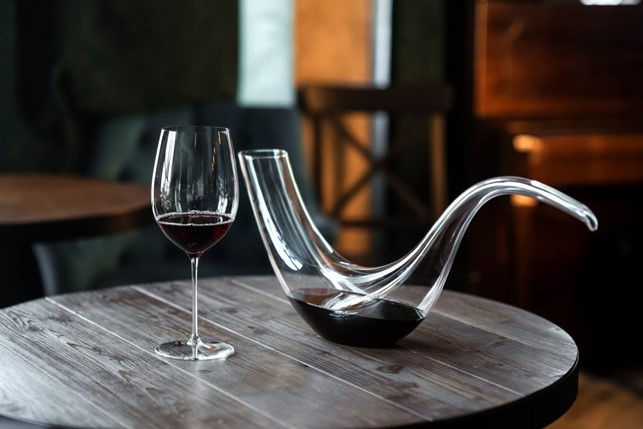Wine lovers will be able to recognize the sinuous and elegant shapes of the decanter: elongated jug, almost in the shape of an ampoule, with an enlarged base and a narrower mouth.
The relationship between base and neck is fundamental, which allows the oxygenation of the wine, and the improvement of its qualities.
Decanting is a great way to oxygenate the wine before enjoying even just a glass during a meal.
The methods and times of decanting vary from wine to wine, and from blend to blend and from grape to grape.
Through the so-called decantation, or rather the airing of the wine, or leaving it to rest, it releases the “noxious” substances to its full taste.
And the liquid takes on more intense, delicate flavors and aromas: even the color is affected, gaining fullness. Using a particular jug, such as the decanter, the residues will settle on the bottom, without “contaminating” the part that will be poured into the glasses.
The best decanters are made of glass or crystal.
In fact, the Romans have already moved from terracotta amphorae to transparent jugs.
It is the Venice of the Renaissance that explores, through melting and blowing, jugs and containers with the most diverse shapes and profiles, and thus creates the decanter.
The decanter, with its sinuous shape, "imitates" the effect obtained when the glass is swirled: it stimulates the oxidation processes and increases the aromaticity of the liquid.
Glass contributes, and lends itself perfectly, to this reaction. Not very porous material, it ensures that the wine does not lose its organoleptic qualities, but rather perfections. Glass, and even more so glass crystal, does not absorb the chemical substances of the liquid, and preserves them in purity: in this way, exposure to air, and the loss of residues, will only strengthen its aromas, nuances and tones.
The glass jug then acts as a thermal insulator, and is impenetrable, in itself, even to external gaseous agents.
This means that the wine will therefore be well preserved on the one hand and enhanced by the glass decanter on the other.
Source: betterinvetro





